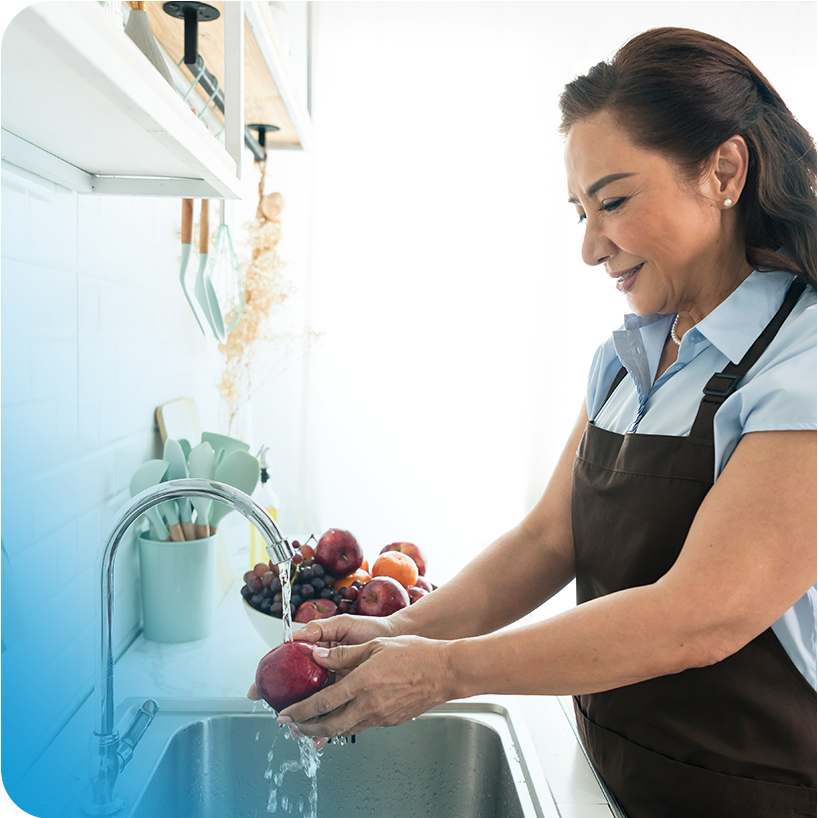
A technician in a Triple-T uniform walks confidently toward the camera, carrying tools. The scene cuts to a bright, well-kept suburban home on a sunny day. Next, a close-up shows the technician working on an air conditioning unit, carefully adjusting components. Two Triple-T service vans are shown parked in a driveway. A family smiles and chats inside a clean, modern kitchen. The video ends with the Triple-T Heating, Cooling, and Plumbing logo on a solid blue background.


HVAC Contractors in Spanish Fork, UT
Proudly Serving Utah County & Washington County
with Two Locations in St. George & Spanish Fork
Since our founding in 1974, Triple-T Plumbing, Heating & Air has been a dedicated member of the Spanish Fork, UT community, committed to building lasting relationships with our neighbors throughout Utah County. Our core principle has always been to serve with integrity and a steadfast focus on the well-being and satisfaction of those we assist.
Our approach to service is centered on providing consistent and reliable support for your numerous needs. We believe in clear communication and maintaining a professional demeanor in all our interactions, helping build confidence with every service call.
Our long-standing presence in this region is a testament to the trust our community has placed in us over the decades. We are an insured company and stand behind the quality of our work, reflecting our deep commitment to providing services on which you can rely.
We look forward to continuing our service tradition for many years. Schedule an estimate with our Spanish Fork HVAC contractors by calling (435) 253-6279 today.


Our Commitment to Accessibility
We believe everyone in our community, from Spanish Fork and Washington County to the vibrant neighborhoods of Utah County, deserves simple, reliable access to quality property services.
To make our services more accessible, we offer flexible financial options, including payment plans and financing, helping homeowners and businesses address their property needs without added financial stress. Our team is always ready to discuss these options openly to find the right solution for you.
As a fully insured company offering services backed by solid warranties, we strive to build trust and address property needs as straightforwardly as possible. Our goal is to be a dependable, approachable partner for all your property service needs.


Trusted Service Across Utah & Washington Counties
Serving Our Neighbors Up & Down I-15
Since 1974, we’ve proudly provided dependable service to communities throughout Utah County, including Lehi, Nephi, Orem, Provo, and Springville, as well as Washington County, which encompasses St. George, Bloomington, Washington, Ivins, Santa Clara, Hurricane, Cedar City, and the surrounding areas. Over the years, we’ve built strong relationships by delivering solutions that meet a range of needs while upholding the highest quality standards.
Whether you’re in Utah County or Washington County, you can count on us as a trusted partner dedicated to supporting your community and delivering the care you deserve. Fully insured and deeply rooted in the region, we’re honored to serve the families and businesses that make up these vibrant communities.
It’s a privilege to be a reliable presence, bringing peace of mind and consistent service to households and businesses alike.

If you don’t see your community listed, contact us to see if we can still help!
- Alpine
- American Fork
- Benjamin
- Beryl
- Bluffdale
- Cedar City
- Cedar Hills
- Cottonwood Heights
- Draper
- Eagle Mountain
- Elk Ridge
- Enterprise
- Eureka
- Genola
- Heber
- Herriman
- Highland
- Hildale
- Holladay
- Hurricane
- Ivins
- Kanab
- Kearns Metro Township
- La Verkin
- Leeds
- Lehi
- Lindon
- Mapleton
- Midvale City
- Midway
- Millcreek
- Murray
- Nephi City
- North Salt Lake
- Orem
- Park City
- Payson
- Pleasant Grove
- Provo
- Riverton
- Salem
- Salt Lake City
- Sandy
- Santa Clara
- Santaquin
- Saratoga Springs
- South Jordan
- South Salt Lake
- Spanish Fork
- Springdale
- Springville
- St. George
- Taylorsville
- Toquerville
- Vineyard
- Washington City
- West Jordan
- West Valley
- Woodland Hills

Community Driven Trust
We’re proud to be a name our neighbors know and recommend. Here’s what our happy customers are saying.
-
“Very processional and good craftsmen. I would have both young men do my service work again. Thanks very much!”Jay W.
-
“My plumber was Codey Hardman and he was great! Very nice and fixed the problem in no time! He represents the company well!”Alice T.
-
“Fabulous Work. Very knowledgeable and friendly. I will recommend to all My Family and Friends.”Jim B.
-
“Our 10 year-old hot water heater was acting up. We opted for a new one for peace of mind vs replacing parts. Jose was polite and knowledgable, with excellent people skills. Worked quick and did an excellent job. Definitely recommend.”Sam E.
-
“Cory was amazing! He did such a good job and worked hard to get us hot water. Triple T is the best. I recommend them because they care and the people are super nice and very fair. Thank you for helping us!”Phyllis F.
-
“Gus came the same day we had a problem with HVAC system not working. He came prepared to fix it right then, or to wait a day to consider a new system which we opted out of. Came back today and repaired. He's very friendly, quick and knowledgeable.”Rita W.
-
“Jeff Averett with Triple-T came to our home today to look at our air conditioner. He was on time and professional. He even put on shoe covers to enter our home which I very much appreciated. He diagnosed the problem quickly and accurately.”Jeffery K.
-
“These two young men were great! They came on time and went straight to work. They were friendly & very hard working. They even befriended my overly friendly large dogs. They worked very hard. I certainly appreciate what they did for us.”Rebecca J.
-
“Jose is a very professional, outgoing, and efficient worker. He even helped me move storage items to create a better workspace. He did a beautiful job replacing our 25-year-old water heater. I recommend him highly!”Rebecca E.

The Value of Addressing Service Needs Early
Taking care of service needs quickly leads to easier solutions and helps avoid bigger issues down the line. This forward-thinking approach benefits all property owners. That’s why we provide same-day service whenever possible, emergency support for urgent problems, and even weekend appointments, making it easy to find a time that works for you.
We encourage a forward-thinking perspective on property upkeep. Our role is to provide reliable assistance when you recognize a need, supporting you with reliable service.
Call (435) 253-6279 or contact Triple-T Plumbing, Heating & Air online today to schedule an estimate with an HVAC contractor in Spanish Fork.
